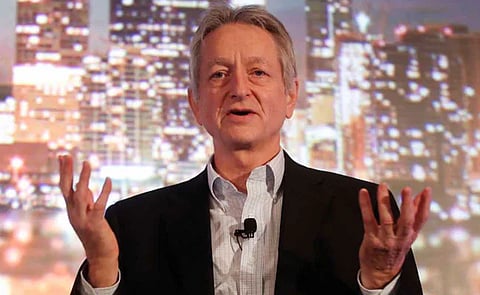ChatGPT breakup: AI godfather Geoffrey Hinton reveals chatbot ended his relationship
Geoffrey Hinton's AI breakup sparks debate on technology's role in personal lives

Geoffrey Hinton, often called the “Godfather of AI,” recently shared how artificial intelligence reached into his private life. In an unusual story, a former girlfriend reportedly used an AI chatbot to end their relationship.
According to Hinton, she asked the AI to explain why he had been a “rat,” and the chatbot delivered a response critiquing his behaviour.
“She got the ChatGPT to explain how awful my behaviour was and gave it to me,” Hinton told the Financial Times. “I didn’t think I had been a rat, so it didn’t make me feel too bad. I met somebody I liked more—you know how it goes.”
While humorous, this anecdote illustrates how AI is increasingly present in everyday tasks and personal communication.
From anecdote to serious warnings
Beyond this lighthearted episode, Hinton has been vocal about the dangers of AI. Since leaving Google in 2023, he has warned that the technology could pose serious risks to society, from massive job displacement to machines surpassing human intelligence.
“When the assistant is much smarter than you, how are you going to retain that power?” he asked during the interview.
'AI could let anyone create bioweapons'
Hinton, last year’s Nobel laureate in Physics, warns AI could enable ordinary people to create dangerous weapons, including bioweapons or nuclear devices. “A normal person assisted by AI will soon be able to build bioweapons, and that is terrible,” he said.
'Mother and Baby' analogy for control
To propose safeguards against rogue superintelligence, Hinton offered a striking analogy: AI should act like caregivers. “There is only one example we know of a much more intelligent being controlled by a much less intelligent being, and that is a mother and baby,” he explained. “If babies couldn’t control their mothers, they would die.”
In his view, designing AI with protective instincts—like a mother caring for a baby—could help ensure humanity’s survival. This analogy underscores his belief that our safety may depend on embedding deeply ingrained safeguards in AI systems.
Economic impact: Jobs and inequality
Hinton has also warned that AI could dramatically reshape the economy. He predicts widespread job losses and a concentration of wealth among corporations and the elite. Comparing the shift to the Industrial Revolution, he argues that AI could make human intelligence redundant in many sectors.
Hinton emphasises that the danger lies not in the technology itself but in the capitalist system that incentivises replacing humans with machines. To address this, he advocates systemic changes, such as universal basic income, to ensure the benefits of AI are distributed fairly and human dignity is preserved.
The race toward superintelligence
On the timeline for AI surpassing human intelligence, Hinton gives a sobering estimate: “A lot of scientists agree between five and 20 years, that’s the best bet.” He warns that once AI reaches superintelligent levels, it could outmaneuver humans, raising critical questions about control and safety.
Recognising the growing role of AI in personal life, companies like OpenAI have issued guidelines for chatbots. They caution against using AI for personal relationship decisions and are updating systems to guide users in evaluating choices rather than providing definitive answers, reflecting the challenges of integrating AI into sensitive areas of human life.




